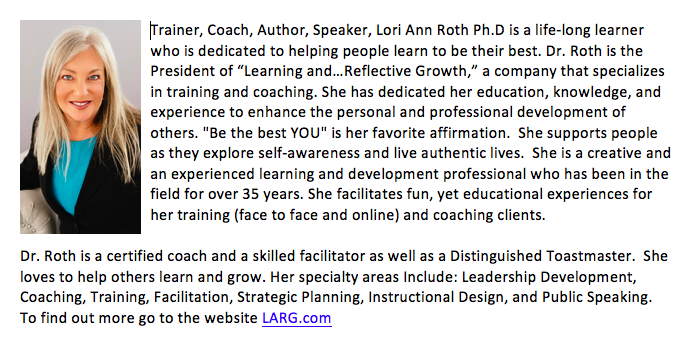Soon you will find yourself in front of a room full of eager learners, ready to impart your wisdom. Except… you’re also battling a nagging voice in the back of your head whispering, “What do you know? They’re going to find out you’re a fraud!” Congratulations, you’re likely experiencing imposter syndrome – a common companion for the “accidental trainer.”
You didn’t set out to be a trainer. You are a subject matter expert, passionate about your field, and suddenly, you are asked to share that knowledge with others. This unexpected transition can trigger a wave of self-doubt. You start questioning your qualifications, compare yourself to seasoned trainers, and fear being exposed as an imposter.
I’ve been in the training and development field for over 40 years and have met so many training professionals. Most – yes over 75% of these professionals that I’ve met, started as a subject matter expert/accidental trainer. On the other hand, I knew when I was 15 years old that I wanted to help adults learn. I designed my education and experience with the goal to be the best-informed and skilled training professional ever! And yet…even I get Imposter Syndrome. Remember, you’re not alone, you can overcome these feelings and embrace your expertise.
What is Imposter Syndrome?
Imposter syndrome isn’t just shyness or a lack of confidence. Imposter syndrome is defined as “a psychological pattern in which an individual doubts their skills, talents, or accomplishments and has a persistent internalized fear of being exposed as a fraud.” It’s a persistent feeling of inadequacy despite evidence of your success. You attribute your achievements to luck, timing, or charm, rather than your actual skills and knowledge. You downplay your accomplishments and constantly fear being “found out” as a fake.
Why is it so Common for Accidental Trainers?
The very nature of “accidentally” becoming a trainer can make you vulnerable to imposter syndrome. You haven’t gone to school for this, taken any workshops, belong to a professional association with other training professionals, or worked in this field. You may feel less legitimate than those who have. You might lack formal training in andragogy, questioning your ability to effectively help adults learn. And the sudden shift from “doer” to “teacher” can be jarring, leaving you feeling unprepared and exposed.
Tips and Strategies
So, how do you silence that inner critic and step into your role as a confident trainer? You can do this and shine while sharing your expertise. Here are some practical strategies:
Acknowledge and Name It
The first step is recognizing that you’re experiencing imposter syndrome. Simply naming the feeling can help diminish its power.
Focus on Your Strengths
Instead of dwelling on your perceived shortcomings, focus on your strengths and expertise. What do you know well? Why did they choose you? What is your expertise? What value do you bring to the training room? What do you know about this subject that others do not know? This is your pearl! You have the inside scoop on what could work and what barriers you can help your learners avoid. You know the way and you can expertly lead your learners down the path to success.
Remember Your “Why”
Why are you training others? What impact do you hope to make? Connecting with your purpose and know your objectives inside and out. Understand exactly what outcome you want to have at the end of the training. What will the learners be able to do after the training that they can’t do or do not know right now? How can you help them? Knowing this can help you overcome self-doubt and stay motivated.
Embrace your Learning Process
No one is a perfect trainer from day one. You will make mistakes, we all do. Just learn from your mistakes. Do not be afraid to correct yourself. Be relatable, humble, approachable, and be human. Do not be afraid to say, “I’m not sure right now, let me find that out for you”. Practice your exercises, directions, and how you will “teach” with your colleagues. Embrace the learning process and view challenges as opportunities for growth.
Connect with Other Trainers
Talking to other trainers, especially those who have experienced imposter syndrome, can be incredibly validating. Use social media to contact other trainers, those who teach what you will be teaching. See if they have any ideas that you can use. Sharing your experiences and learning from others can help you feel less alone.
Seek Feedback
Don’t be afraid to ask for feedback from participants and colleagues. Be aware that now everyone will “like” you or your teaching style. Learn what works for most people. Don’t beat yourself up over the one person in a 25-learner class who just doesn’t get it. But do take everything into consideration and evaluate yourself after each class. Seek to get better after every time you help people learn. Note what worked and what did not work. Change your approach if something bombed or if you got a lot of feedback that something did not work the way you thought it would work. And do not forget to thank each participant in your class for their participation. Constructive criticism can help you improve, while positive feedback can reinforce your confidence.
Be yourself
Think about how you learned how to do what you are “teaching”. You are the subject matter expert (SME) turned trainer. Tell YOUR stories. Be humble, share your mistakes so your learners won’t have to make them. Self-depreciating humor goes a long way, you and your learners will feel more relaxed if you laugh. You will feel more relaxed using your stories instead of using textbook examples or a list someone else created.
Celebrate Your Wins
Acknowledge and celebrate your accomplishments, no matter how small. Keep a “win file” where you document positive feedback and successful training sessions. Every trainer I know has a Kudos file in a drawer or as a folder in their email. These are “thank you” notes or wonderful evaluations from learners. When you are feeling imposter syndrome, go back and read these kudos!
You Can Do It!
Be patient with yourself, celebrate your progress, and remember that your expertise is valuable. By acknowledging your imposter syndrome, being yourself, and focusing on your strengths, you can embrace your role as a trainer and make a real difference in the lives of your learners. You’re not an imposter; you’re a valuable resource, ready to share your knowledge and passion with the world. Let me know your experience as an accidental trainer. We can all learn from each other.




